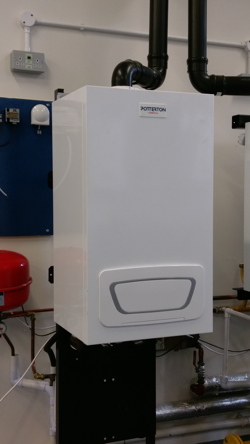Top tips for choosing a light-commercial boiler

Light commercial boilers with outputs from 40 to 70 kW can be used for a variety of light-commercial applications. But with so many models now on the market, how do you know if you are getting the right one for the job? Steven Evans of Potterton Commercial gives his top tips on the feature comparisons that will ensure you get the right boiler.
From restaurants and hairdressers to doctors’ surgeries and community centres, there is a wealth of opportunities for heating engineers to work on light commercial installations. Light commercial is very much a cross-over area in the heating industry, where domestic installers can operate up to 70 kW without the need for additional qualifications; in recent years, manufacturers have increasingly provided heating products for this buoyant sector.
With so many boilers to choose from, selecting the right model for an application can be an overwhelming task, particularly if it’s not a sector you work in a lot. Here are our top tips to help your selection.
Energy efficiency
The first thing to look for is efficiency. Energy efficiency is always a top priority, whether it’s to reduce fuel bills or cut down on a building’s carbon emissions. Energy efficiency is particularly important for local-authority buildings, such as community centres or libraries, as some may fall under the updated Display Energy Certificates requirements which now apply to buildings over 250 m2 that are frequently visited by the public.
Thanks to the recent Energy Labelling Directive (ErP), comparing the energy efficiency of light commercial boilers is relatively straightforward. Since the legislation came into force, space and combi heaters of up to 70 kW now require an energy label with a rating ranging from A++ to G. When used alongside energy-efficiency data, these labels can help engineers decide on the most efficient solutions.
For example, Potterton Commercial’s recently launched Paramount four 50 kW wall-hung boiler is very efficient, with an ErP rating of A. A 6:1 modulation ratio means it can meet variable heating demands to deliver excellent carbon and cost savings.
To ensure a boiler reaches its maximum efficiency, it must be sized correctly, so you need to know from the outset how much heat and hot water the building is going to need. Closely matching demand and supply will result in the boiler running to its maximum efficiency and the end user being happier with the performance of their boiler.
Controls
Whether it’s on-board or ancillary controls, these too can improve the efficiency and usability of a boiler. Zone controls are ideal for buildings with different areas that don’t need to be heated in the same way. Some newer commercial boilers come fitted with weather-compensation controls, which allow the boiler to regulate its output in line with the temperature outside.
Boiler dimensions
The location of the boiler installation may also influence your choice of model, so have the maximum dimensions to hand when you search for a boiler and a good understanding of the pros and cons of where it will be installed.

Wall-hung boilers are very popular and offer a neat and tidy installation. Floor-standing alternatives are often more appropriate for older buildings that are listed or have unstable walls. Newer floor standing models have very small footprints and can fit into even the most compact of spaces.
You may find that the weight of the boiler itself can vary between models. A light, compact boiler will be easier to manoeuvre and install, particularly in tight spaces, and can save the engineer time on installation.
Cost
Boiler replacements are often a distress purchase, so you may need to shop around to find a boiler which offers the customer good value. Often a good, high-efficiency boiler will meet a customer’s needs and their budget. Look out for offers too; discounts on flues are popular at the moment.
Warranty
Comparing the lengths of various boiler warranties should give you a good indication of the quality of the product you are buying. Nothing shows the confidence a manufacturer has in its products more than an extended warranty. Warranties offer installers and end users added peace of mind against the expense of unexpected repairs. Remember to read the small print on warranties, particularly relating to commissioning, the use of non-genuine parts and servicing requirements to ensure the terms and conditions aren’t unwittingly broken.
When it comes to specifying light-commercial boilers, it certainly pays to do your homework to ensure that you choose a boiler which has all the features that matter most to the customer.
This is the best way to guarantee better quality, increasingly efficient installations and more satisfied customers.
Steven Evans is national sales manager at Potterton Commercial.







